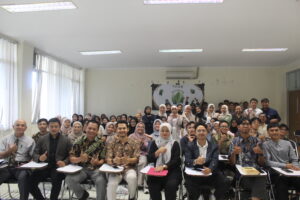
Bandung — The Department of Agrotechnology, Faculty of Science and Technology, UIN Sunan Gunung Djati Bandung, successfully held the Agrotechnology Monthly Seminar 2025 on Wednesday (Sept. 10, 2025). The event took place in Room 3.09 from 09.00 to 11.30 and brought together lecturers and students in an interactive academic forum.
The seminar featured two main sessions: a plenary session and parallel student presentations. Keynote speaker Mrs. Neneng Sri Widayani, S.P., M.P. opened the plenary with her presentation on Insect Resistance to Insecticides. The session drew strong attention from participants, who raised critical questions on the future of pest control and sustainable management.
During the discussion, students asked whether resistance is inevitable and how to manage it effectively.
- M. Dhafin (2022) questioned if insect resistance occurs unconditionally. Mrs. Neneng explained that resistance does not equally affect all pests, particularly underground pests, and emphasized the importance of consulting the Insecticide Resistance Action Committee (IRAC) for guidance. She added that dosage adjustment and the use of varied active ingredients are crucial.
- Syifa Nazwa Nur Maulida (2025) asked whether new pesticides should be developed to counter resistance. Neneng suggested combining multiple active ingredients, highlighting that organic pesticides often provide more diversity than synthetic ones.
- Rizqia (2022) raised concerns about the possibility of all pests becoming resistant in the future. Neneng confirmed the potential but noted that proper management practices and region-specific approaches can slow or prevent widespread resistance.
The parallel session showcased research presentations by Agrotechnology students:
- Nur Indah Khumaeroh presented on Utilization of Citarum Watershed Sediment Soil Contaminated with Cadmium (Cd) with Organic Materials on Shallots (Allium ascalonicum L.) Batu Ijo Variety.
- Nida Sayyidah explained her study, How AMF Can Protect Onions from Devastating Disease?
- Lediva Sephia Agisny discussed Rice Farming Combined with Tilapia Fish Using the Aquaponics Method.
The student-led session also featured active Q&A.
- Akmal (2025) asked about sustainable farming systems in rural areas. Lediva cited a case study in Sragen where aquaponics facilities opened to both professionals and farmers, offering significant benefits.
- Nadaa (2023) questioned whether tilapia could be substituted in the system. Lediva responded that alternatives such as carp, catfish, or gourami are viable.
- Ellana (2023) asked about the harvest time. Lediva noted that both fish and plants can be harvested in about six months.
- Syifa (2025) pressed on affordability, to which Lediva confirmed the system’s low cost, although specific figures were not provided.
- Syifa (2025) also raised concerns about polluted river water. Nur Indah explained that her research focuses on neutralizing heavy metals through organic amendments, which can mitigate the harmful impact of contaminated soils.
The seminar concluded with a lively discussion, reflecting the strong enthusiasm of students and lecturers. The Agrotechnology Monthly Seminar 2025 reaffirmed its role as a platform for knowledge exchange, innovation, and the strengthening of academic collaboration in agricultural sciences.


